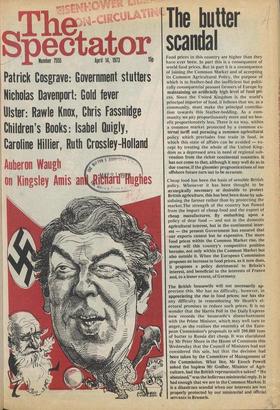The butter scandal
Food prices in this country are higher than they have ever been. In part this is a consequence of world food prices. But in part it is a consequence of joining the Common Market and of accepting its Common Agricultural Policy, the purpose of which is to feather-bed the inefficient but politically consequential peasant farmers of Europe by maintaining an artificially high level of food prices. Since the United Kingdom is the world's principal importer of food, it follows that we, as a community, must make the principal. contribution towards this feather-bedding. As a community we pay proportionately more and we benefit proportionately less. There is no way, within a common market protected by a common external tariff and pursuing a common agricultural policy which precludes free trade in food, in which this state of affairs can be avoided — except by treating the whole of the United Kingdom as a depressed area in need of regional subvention from the richer continental countries. It has not come to that, although it may well do so in due course, if the gloomier prognostications of our offshore future turn Out to be accurate.
Cheap food has been the basis of sensible British policy. Whenever it has been thought to be strategically necessary or desirable to protect British agriculture, this has best been done by subsidising the farmer rather than by protecting the market.The strength of the country has flowed from the import of cheap food and the export of cheap manufactures. By embarking upon a policy of dear food — and not in the domestic agricultural interest, but in the continental interest — the present Government has ensured that our exports cannot but be expensive. The more food prices within the Common Market rise, the worse will this country's competitive position become, not only within the Common Market but also outside it. When the European Commission proposes an increase in food prices, as it now does, it proposes a policy detrimental to Britain's interest, and beneficial to the interests of France and, to a lesser extent, of Germany.
The British housewife will not necessarily appreciate this. She has no difficulty, however, in appreciating the rise in food prices; nor has she any difficulty in remembering Mr Heath's electoral promises to reduce such prices. It is no wonder that the Harris Poll in the Daily Express now records the housewife's disenchantment with the Prime Minister, which may well turn to anger, as she realises the enormity of the European Commission's proposals to sell 200,000 tons of butter to Russia dirt cheap. It was elucidated by Mr Peter Shore in the House of Commons this Wednesday that the Council of Ministers had not considered this sale, but that the decision had been taken by the Committee of Management of the Commission. What line, Mr Enoch Powell asked the hapless Mr Godber, Minister of Agriculture, had the British representative taken? "He abstained," was the ludicrous ministerial reply. It is bad enough that we are in the Common Market. It is a disastrous scandal when our interests are not properly protected by our ministerial and official servants in Brussels.


































